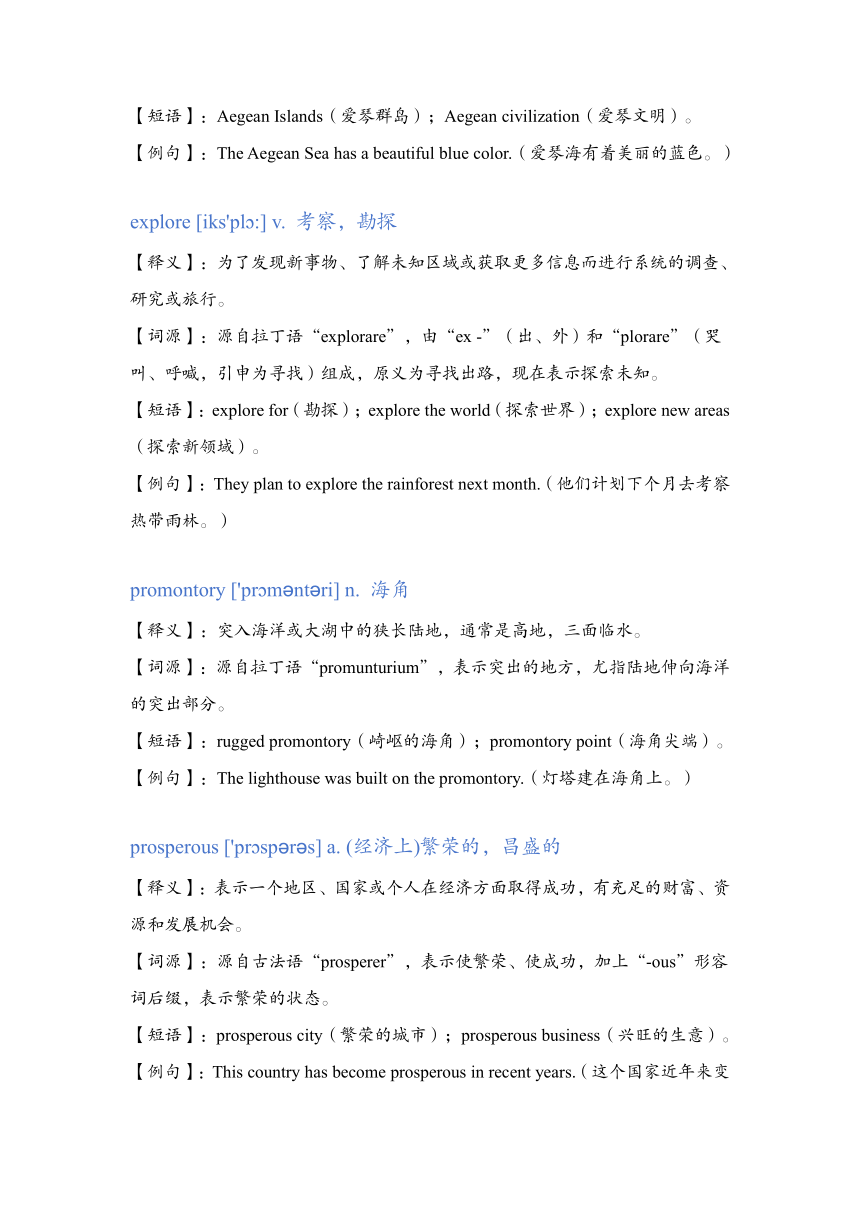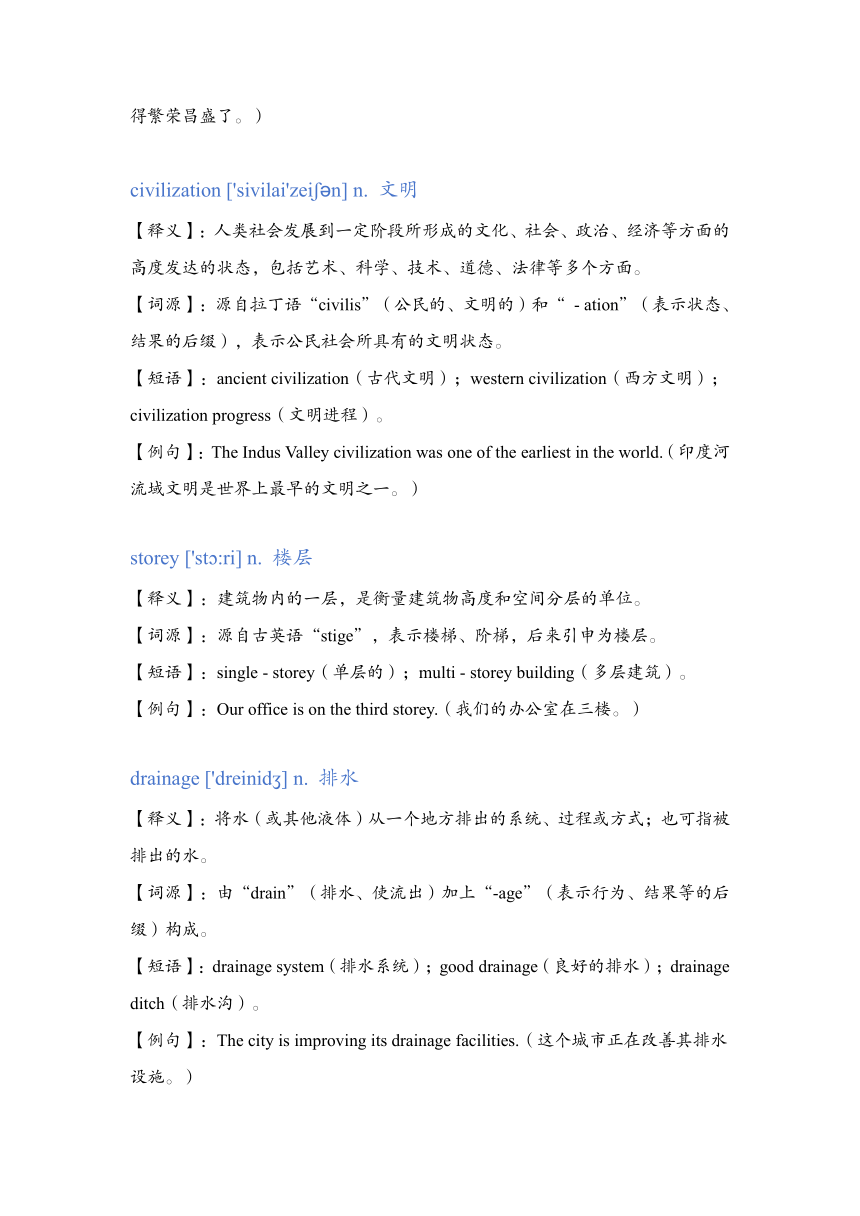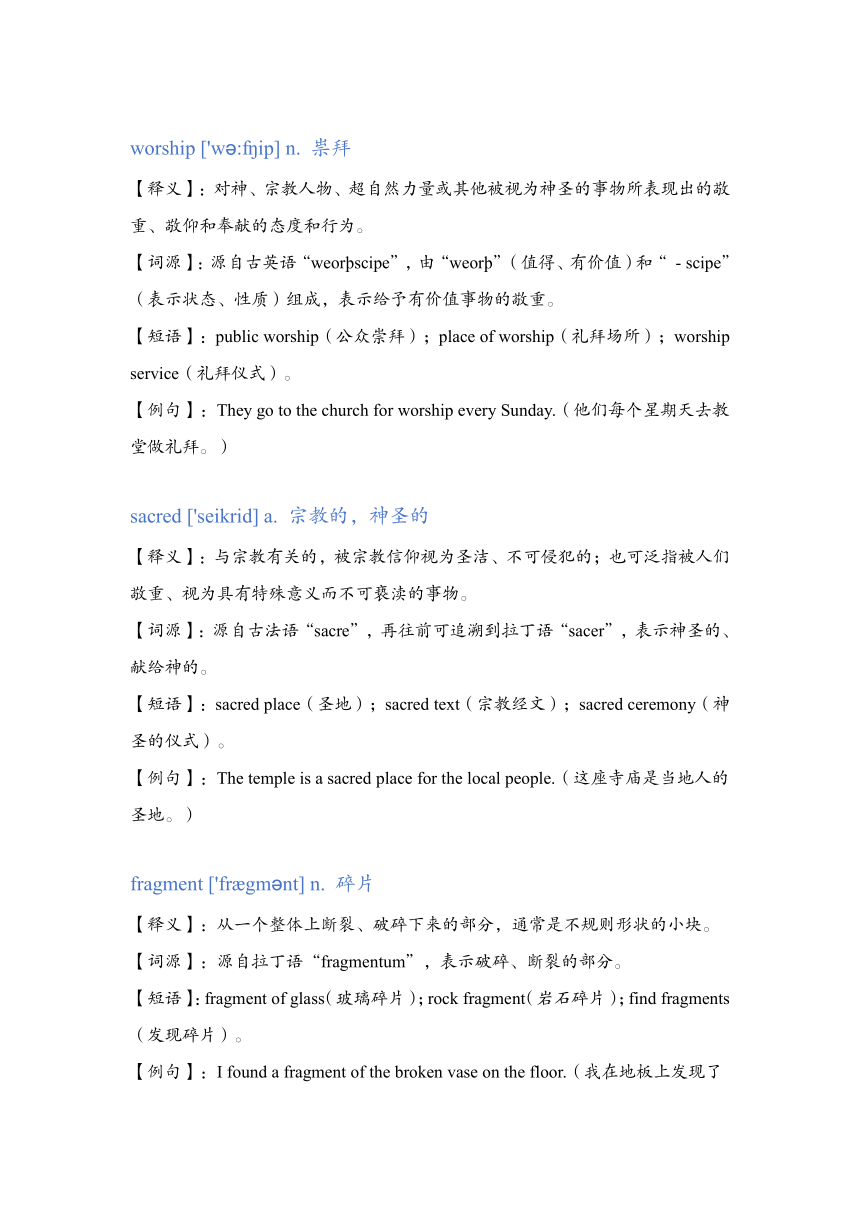新概念第三册Lesson 3 An unknown goddess讲义
文档属性
| 名称 | 新概念第三册Lesson 3 An unknown goddess讲义 |

|
|
| 格式 | docx | ||
| 文件大小 | 175.1KB | ||
| 资源类型 | 教案 | ||
| 版本资源 | 新概念英语 | ||
| 科目 | 英语 | ||
| 更新时间 | 2024-12-04 00:00:00 | ||
图片预览





文档简介
新概念第三册
Lesson 3 An unknown goddess
单词精讲
goddess ['g dis] n.女神
【释义】:女性的神,在神话传说中被崇拜、具有超自然力量和特殊地位的女性形象。
【词源】:由“god”(神)加上“-ess”(表示女性的后缀)组成,表示女性的神。
【短语】:goddess of love(爱之女神);moon goddess(月亮女神)。
【例句】:Aphrodite was the goddess of love in Greek mythology.(阿芙洛狄忒是希腊神话中的爱之女神。)
archaeologist ['a:ki 'l d ist] n. 考古学家
【释义】:专门从事考古学研究的人,通过挖掘、分析古代遗迹、文物等来了解过去人类的生活、文化等。
【词源】:由“archaeology”(考古学)加上“-ist”(表示人的后缀)构成。“archaeology”源自希腊语“arkhaiologia”,其中“arkhaios”表示古代的,“logia”表示学问。
【短语】:famous archaeologist(著名考古学家);archaeologist team(考古学家团队)。
【例句】:The archaeologist discovered an ancient tomb.(这位考古学家发现了一座古墓。)
aegean [i:'d i: n] a. 爱琴海的
【释义】:与爱琴海(位于希腊和土耳其之间的海域)相关的,用来形容来自爱琴海地区的事物。
【词源】:以爱琴海(Aegean Sea)命名,直接表示与该海域有关的属性。
【短语】:Aegean Islands(爱琴群岛);Aegean civilization(爱琴文明)。
【例句】:The Aegean Sea has a beautiful blue color.(爱琴海有着美丽的蓝色。)
explore [iks'pl :] v. 考察,勘探
【释义】:为了发现新事物、了解未知区域或获取更多信息而进行系统的调查、研究或旅行。
【词源】:源自拉丁语“explorare”,由“ex -”(出、外)和“plorare”(哭叫、呼喊,引申为寻找)组成,原义为寻找出路,现在表示探索未知。
【短语】:explore for(勘探);explore the world(探索世界);explore new areas(探索新领域)。
【例句】:They plan to explore the rainforest next month.(他们计划下个月去考察热带雨林。)
promontory ['pr m nt ri] n. 海角
【释义】:突入海洋或大湖中的狭长陆地,通常是高地,三面临水。
【词源】:源自拉丁语“promunturium”,表示突出的地方,尤指陆地伸向海洋的突出部分。
【短语】:rugged promontory(崎岖的海角);promontory point(海角尖端)。
【例句】:The lighthouse was built on the promontory.(灯塔建在海角上。)
prosperous ['pr sp r s] a. (经济上)繁荣的,昌盛的
【释义】:表示一个地区、国家或个人在经济方面取得成功,有充足的财富、资源和发展机会。
【词源】:源自古法语“prosperer”,表示使繁荣、使成功,加上“-ous”形容词后缀,表示繁荣的状态。
【短语】:prosperous city(繁荣的城市);prosperous business(兴旺的生意)。
【例句】:This country has become prosperous in recent years.(这个国家近年来变得繁荣昌盛了。)
civilization ['sivilai'zei n] n. 文明
【释义】:人类社会发展到一定阶段所形成的文化、社会、政治、经济等方面的高度发达的状态,包括艺术、科学、技术、道德、法律等多个方面。
【词源】:源自拉丁语“civilis”(公民的、文明的)和“ - ation”(表示状态、结果的后缀),表示公民社会所具有的文明状态。
【短语】:ancient civilization(古代文明);western civilization(西方文明);civilization progress(文明进程)。
【例句】:The Indus Valley civilization was one of the earliest in the world.(印度河流域文明是世界上最早的文明之一。)
storey ['st :ri] n. 楼层
【释义】:建筑物内的一层,是衡量建筑物高度和空间分层的单位。
【词源】:源自古英语“stige”,表示楼梯、阶梯,后来引申为楼层。
【短语】:single - storey(单层的);multi - storey building(多层建筑)。
【例句】:Our office is on the third storey.(我们的办公室在三楼。)
drainage ['dreinid ] n. 排水
【释义】:将水(或其他液体)从一个地方排出的系统、过程或方式;也可指被排出的水。
【词源】:由“drain”(排水、使流出)加上“-age”(表示行为、结果等的后缀)构成。
【短语】:drainage system(排水系统);good drainage(良好的排水);drainage ditch(排水沟)。
【例句】:The city is improving its drainage facilities.(这个城市正在改善其排水设施。)
worship ['w : ip] n. 祟拜
【释义】:对神、宗教人物、超自然力量或其他被视为神圣的事物所表现出的敬重、敬仰和奉献的态度和行为。
【词源】:源自古英语“weor scipe”,由“weor ”(值得、有价值)和“ - scipe”(表示状态、性质)组成,表示给予有价值事物的敬重。
【短语】:public worship(公众崇拜);place of worship(礼拜场所);worship service(礼拜仪式)。
【例句】:They go to the church for worship every Sunday.(他们每个星期天去教堂做礼拜。)
sacred ['seikrid] a. 宗教的,神圣的
【释义】:与宗教有关的,被宗教信仰视为圣洁、不可侵犯的;也可泛指被人们敬重、视为具有特殊意义而不可亵渎的事物。
【词源】:源自古法语“sacre”,再往前可追溯到拉丁语“sacer”,表示神圣的、献给神的。
【短语】:sacred place(圣地);sacred text(宗教经文);sacred ceremony(神圣的仪式)。
【例句】:The temple is a sacred place for the local people.(这座寺庙是当地人的圣地。)
fragment ['fr gm nt] n. 碎片
【释义】:从一个整体上断裂、破碎下来的部分,通常是不规则形状的小块。
【词源】:源自拉丁语“fragmentum”,表示破碎、断裂的部分。
【短语】:fragment of glass(玻璃碎片);rock fragment(岩石碎片);find fragments(发现碎片)。
【例句】:I found a fragment of the broken vase on the floor.(我在地板上发现了破碎花瓶的一个碎片。)
remains [ri'meinz] n. 遗物,遗迹,废墟
【释义】:指过去留下来的东西,如古代文明的遗物(如文物、化石等)。
也可表示建筑物或地方遭受破坏后剩下的部分,即废墟或遗迹。
【词源】:“remain”的复数形式,“remain”源自古法语“remaindre”,表示留下、遗留,其复数形式表示遗留下来的东西。
【短语】:ancient remains(古代遗迹);human remains(人类遗骸);remains of the building(建筑物的废墟)。
【例句】:The archaeologists are studying the remains of an ancient city.(考古学家正在研究一座古城的遗迹。)
classical ['kl sik l] a. (希腊和罗马)古文化的
【释义】:与古希腊和古罗马文化相关的,具有古希腊和古罗马文化的特征、风格或传统的。
【词源】:源自拉丁语“classicus”,最初表示属于最高等级的、经典的,用于形容古希腊和古罗马文化的经典性。
【短语】:classical literature(古典文学);classical architecture(古典建筑);classical period(古典时期)。
【例句】:We studied classical Greek mythology in school.(我们在学校学习了古希腊神话。)
reconstruct ['ri:k ns'tr kt] v. 修复
【释义】:重新构建、修复已经损坏、毁坏或失去的东西,使其恢复到原来的状态或尽可能接近原来的状态。
【词源】:由“re -”(重新、再)、“construct”(构建、建造)组成,表示重新建造的意思,在文物、建筑等方面表示修复。
【短语】:reconstruct a building(修复一座建筑物);reconstruct the past(重现过去)。
【例句】:They are trying to reconstruct the ancient palace.(他们正在努力修复这座古老的宫殿。)
rest [rest] v. 倚放,放置
【释义】:将物体靠在另一物体上或放置在某个地方,使其处于支撑或静止状态。
【词源】:源自古英语“r stan”,表示休息、静止,后来引申为将物体放置使其静止的动作。
【短语】:rest against(靠在...上);rest on(搁在...上;依靠)。
【例句】:He rested his bike against the wall.(他把自行车靠在墙上。)
hip [hip] n. 屁股,臀部
【释义】:人体腰部以下大腿以上的部位,是身体的一部分。
【词源】:源自古英语“hype”,表示臀部。
【短语】:hip joint(髋关节);wide hip(宽臀部)。
【例句】:She fell and hurt her hip.(她摔倒了,伤到了臀部。)
full - length a. (裙衣)拖地长的
【释义】:形容裙子或衣服的长度很长,长到拖地的程度。
【词源】:由“full”(完全的、充分的)和“length”(长度)组成,表示具有完全的长度,即拖地的长度。
【短语】:full - length dress(拖地长裙);full - length coat(拖地长外套)。
【例句】:She wore a beautiful full - length evening gown.(她穿着一件漂亮的拖地晚礼服。)
graceful ['greisful] a. 优雅的
【释义】:动作、姿态或外形优美、高雅,具有一种自然的、吸引人的美感。
【词源】:由“grace”(优雅、优美)加上“-ful”(表示充满...的)后缀组成,表示充满优雅的。
【短语】:graceful dance(优雅的舞蹈);graceful movement(优雅的动作)。
【例句】:The ballet dancer's movements were very graceful.(这位芭蕾舞演员的动作非常优雅。)
identity [ai'dentiti] n. 身份
【释义】:一个人或事物区别于其他的独特特征、属性,可包括姓名、性别、国籍、社会角色等方面的标识。
【词源】:源自拉丁语“identitas”,表示相同性、同一性,用于表示确定一个人的独特身份。
【短语】:identity card(身份证);cultural identity(文化身份);personal identity(个人身份)。
【例句】:Please show your identity card at the entrance.(请在入口处出示你的身份证。)
重点语法
1> turn out…(表示结果)结果是, 原来是 (= prove, 都表示系动词)
turn out (to be)+ n./adj.
-- The concert turned out to be a failure.
-- Our party turned out (to be) a success. 我们的聚会非常的成功。
2> It turned out + that从句 (it作形式主语)
It turned out +其它名词从句
-- It turned out that the diamonds had been in the bank all the time.
原来钻石一直都在银行里保存着。
-- It turned out that his statement was false. 原来他的话是假的。
3> as it turns out… 后来人们发现…
-- As it turned out, there was no need to worry. 后来人们发现, 没有必要担心。
-- As it turned out, the report was mistaken. 后来人们发现, 报告被弄错了
三、课文精讲
1 How did the archaeologists know that the statue was a goddess
Some time ago, an interesting discovery was made by archaeologists on
the Aegean island of Kea.
some time 1>经过若干时间 2>在未来的某时
sometime adv.在某一时候, 曾经, 有一天
sometimes adv.不时, 有时
中文习惯用主动语态。
英文习惯用被动语态。以事件、结果、影响、效果为主语,强调对客观事实的陈述。
2 An American team explored a temple which stands in an ancient city on
the promontory of Ayia Irini.
which引导定语从句,修饰限定temple。(which = that)
stand(不及物) = lie(不及物) 位于
= situate(及物) 使位于, 使处于
= locate(及物) 使...坐落于, 位于
which stands in... = which lies in… = which is located in… = which is situated in...
Stand 1 >身高 2>表示高高坐落于, 矗立于
-- She stands 1.75m. 她身高1.75米
-- A great tree stands on the mount. 一棵大树竖立在山上。
3 The city at one time must have been prosperous, for it enjoyed a high
level of civilization.
for 引导原因状语从句:对主句的附加说明和解释,提供更多的信息。
because 引导原因状语从句:强调原因。
-- The day broke for the birds were singing.
at one time 表达曾经, 一度(过去时态的标志, = once)
must have been 对过去事实肯定的推测
enjoyed a high level of civilization 享有高度文明
4 Houses--often three storeys high-- were built of stone.
They had large rooms with beautifully decorated walls.
With… 具有…
-- a young man with broad shoulders / an old lady with black hair
beautifully decorated 过去分词做定语
-- a beautifully dressed lady 衣着漂亮的女士
-- a deserted car park 废弃的停车场
-- a white painted door 被刷成白色的门
现在分词做定语, 被修饰词与修饰词之间为逻辑主动关系
-- a boy climbing the tree 正在爬树的男孩
-- the students reading in the room 正在房间里读书的学生
5 The city was equipped with a drainage system, for a great many clay
pipes were found beneath the narrow streets.
be equipped with 配备, 装备 (equip vt.装备, 配备)
air conditioning 空气调节装置 / air conditioner 空气调节机, 空调设备
-- The car was equipped with air conditioning.
for 引导原因状语从句
在正下方:Beneath = under
-- beneath the narrow streets = under the narrow streets
-- He is standing under/beneath the umbrella.
在进行中:只能用under
-- under control 控制之中 / under discussion 讨论之中 / under repairs修理之中
below 在下方(强调在斜下方)
-- She is sitting below the window
6 The temple which the archaeologists explored was used as a place of
worship from the fifteenth century B.C. until Roman times.
be used as / be used to be 把…用作为
-- The box was used as a desk in the small village school.
-- The wooden box was used as a bookcase.
be used to do 被用来做…
-- The wooden box is used to contain books
7 In the most sacred room of temple, clay fragments of fifteen statues
were found.Each of these represented a goddess and had, at one time, been painted.
represent vt.代表
-- I represent all the classmates.
8 The body of one statue was found among remains dating from the
fifteenth century B.C.
dating 现在分词, 修饰remains
date from = date back to (开始于…, 起始于…)
-- The custom dating from 1990. (custom n.习惯, 风俗)
-- The tradition dates from the time when his grandfather was young.
-- The castle dates from the 14th century. = The castle dates back to the 14th century.
城堡建造于14世纪
9 Its missing head happened to be among remains of the fifth century B.C.
happen to 偶然, 碰巧(强调事情的偶然发生)
-- I happen to have driven that kind of car. 我恰巧开过那种车。
-- He happened to find the ticket in his pocket.
It happens that +从句
-- It happened that I met her on my way to work.
= I happened to meet her on my way work.
happen on 碰巧碰上
-- I happened on this old picture in the back of the drawer.
我偶然的在抽屉的背面发现了这张旧照片。
-- Guess, who did I happen on while I was in London last month
10 This head must have been found in Classical times and carefully
preserved.It was very old and precious even then.
When the archaeologists reconstructed the fragments, they were amazed
to find that the goddess turned out to be a very modern-looking woman.
Reconstruct = put together, piece together, restore(vt.恢复, 使回复)
Amazed = very much surprised
surprised > astonished > amazed > astounded 感到惊讶(语气递增)
to find... / to discover... / to realize... / to see…
-- I m not surprised to see you here
11 She stood three feet high and her hands rested on her hips.
rest on v.被搁在, 停留在, 信赖
= depend on(依靠, 依赖)/ lean on(靠着)
-- His hand rested lightly on my shoulder
12 She was wearing a full-length skirt which swept the ground.
which swept the ground 近一步说明拖地的,拽地的
13 Despite her great age, she was very graceful indeed, but, so far,
the archaeologists have been unable to discover her identity.
But,so far, the archaeologists have been unable to discover her identity.
= It is still a problem for the archaeologists up to now.
Despite = in spite of (两者都是介词),后面+ 名词/动名词
so far, up to now 完成时的标志
discover her identity = find out her identity
Lesson 3 An unknown goddess
单词精讲
goddess ['g dis] n.女神
【释义】:女性的神,在神话传说中被崇拜、具有超自然力量和特殊地位的女性形象。
【词源】:由“god”(神)加上“-ess”(表示女性的后缀)组成,表示女性的神。
【短语】:goddess of love(爱之女神);moon goddess(月亮女神)。
【例句】:Aphrodite was the goddess of love in Greek mythology.(阿芙洛狄忒是希腊神话中的爱之女神。)
archaeologist ['a:ki 'l d ist] n. 考古学家
【释义】:专门从事考古学研究的人,通过挖掘、分析古代遗迹、文物等来了解过去人类的生活、文化等。
【词源】:由“archaeology”(考古学)加上“-ist”(表示人的后缀)构成。“archaeology”源自希腊语“arkhaiologia”,其中“arkhaios”表示古代的,“logia”表示学问。
【短语】:famous archaeologist(著名考古学家);archaeologist team(考古学家团队)。
【例句】:The archaeologist discovered an ancient tomb.(这位考古学家发现了一座古墓。)
aegean [i:'d i: n] a. 爱琴海的
【释义】:与爱琴海(位于希腊和土耳其之间的海域)相关的,用来形容来自爱琴海地区的事物。
【词源】:以爱琴海(Aegean Sea)命名,直接表示与该海域有关的属性。
【短语】:Aegean Islands(爱琴群岛);Aegean civilization(爱琴文明)。
【例句】:The Aegean Sea has a beautiful blue color.(爱琴海有着美丽的蓝色。)
explore [iks'pl :] v. 考察,勘探
【释义】:为了发现新事物、了解未知区域或获取更多信息而进行系统的调查、研究或旅行。
【词源】:源自拉丁语“explorare”,由“ex -”(出、外)和“plorare”(哭叫、呼喊,引申为寻找)组成,原义为寻找出路,现在表示探索未知。
【短语】:explore for(勘探);explore the world(探索世界);explore new areas(探索新领域)。
【例句】:They plan to explore the rainforest next month.(他们计划下个月去考察热带雨林。)
promontory ['pr m nt ri] n. 海角
【释义】:突入海洋或大湖中的狭长陆地,通常是高地,三面临水。
【词源】:源自拉丁语“promunturium”,表示突出的地方,尤指陆地伸向海洋的突出部分。
【短语】:rugged promontory(崎岖的海角);promontory point(海角尖端)。
【例句】:The lighthouse was built on the promontory.(灯塔建在海角上。)
prosperous ['pr sp r s] a. (经济上)繁荣的,昌盛的
【释义】:表示一个地区、国家或个人在经济方面取得成功,有充足的财富、资源和发展机会。
【词源】:源自古法语“prosperer”,表示使繁荣、使成功,加上“-ous”形容词后缀,表示繁荣的状态。
【短语】:prosperous city(繁荣的城市);prosperous business(兴旺的生意)。
【例句】:This country has become prosperous in recent years.(这个国家近年来变得繁荣昌盛了。)
civilization ['sivilai'zei n] n. 文明
【释义】:人类社会发展到一定阶段所形成的文化、社会、政治、经济等方面的高度发达的状态,包括艺术、科学、技术、道德、法律等多个方面。
【词源】:源自拉丁语“civilis”(公民的、文明的)和“ - ation”(表示状态、结果的后缀),表示公民社会所具有的文明状态。
【短语】:ancient civilization(古代文明);western civilization(西方文明);civilization progress(文明进程)。
【例句】:The Indus Valley civilization was one of the earliest in the world.(印度河流域文明是世界上最早的文明之一。)
storey ['st :ri] n. 楼层
【释义】:建筑物内的一层,是衡量建筑物高度和空间分层的单位。
【词源】:源自古英语“stige”,表示楼梯、阶梯,后来引申为楼层。
【短语】:single - storey(单层的);multi - storey building(多层建筑)。
【例句】:Our office is on the third storey.(我们的办公室在三楼。)
drainage ['dreinid ] n. 排水
【释义】:将水(或其他液体)从一个地方排出的系统、过程或方式;也可指被排出的水。
【词源】:由“drain”(排水、使流出)加上“-age”(表示行为、结果等的后缀)构成。
【短语】:drainage system(排水系统);good drainage(良好的排水);drainage ditch(排水沟)。
【例句】:The city is improving its drainage facilities.(这个城市正在改善其排水设施。)
worship ['w : ip] n. 祟拜
【释义】:对神、宗教人物、超自然力量或其他被视为神圣的事物所表现出的敬重、敬仰和奉献的态度和行为。
【词源】:源自古英语“weor scipe”,由“weor ”(值得、有价值)和“ - scipe”(表示状态、性质)组成,表示给予有价值事物的敬重。
【短语】:public worship(公众崇拜);place of worship(礼拜场所);worship service(礼拜仪式)。
【例句】:They go to the church for worship every Sunday.(他们每个星期天去教堂做礼拜。)
sacred ['seikrid] a. 宗教的,神圣的
【释义】:与宗教有关的,被宗教信仰视为圣洁、不可侵犯的;也可泛指被人们敬重、视为具有特殊意义而不可亵渎的事物。
【词源】:源自古法语“sacre”,再往前可追溯到拉丁语“sacer”,表示神圣的、献给神的。
【短语】:sacred place(圣地);sacred text(宗教经文);sacred ceremony(神圣的仪式)。
【例句】:The temple is a sacred place for the local people.(这座寺庙是当地人的圣地。)
fragment ['fr gm nt] n. 碎片
【释义】:从一个整体上断裂、破碎下来的部分,通常是不规则形状的小块。
【词源】:源自拉丁语“fragmentum”,表示破碎、断裂的部分。
【短语】:fragment of glass(玻璃碎片);rock fragment(岩石碎片);find fragments(发现碎片)。
【例句】:I found a fragment of the broken vase on the floor.(我在地板上发现了破碎花瓶的一个碎片。)
remains [ri'meinz] n. 遗物,遗迹,废墟
【释义】:指过去留下来的东西,如古代文明的遗物(如文物、化石等)。
也可表示建筑物或地方遭受破坏后剩下的部分,即废墟或遗迹。
【词源】:“remain”的复数形式,“remain”源自古法语“remaindre”,表示留下、遗留,其复数形式表示遗留下来的东西。
【短语】:ancient remains(古代遗迹);human remains(人类遗骸);remains of the building(建筑物的废墟)。
【例句】:The archaeologists are studying the remains of an ancient city.(考古学家正在研究一座古城的遗迹。)
classical ['kl sik l] a. (希腊和罗马)古文化的
【释义】:与古希腊和古罗马文化相关的,具有古希腊和古罗马文化的特征、风格或传统的。
【词源】:源自拉丁语“classicus”,最初表示属于最高等级的、经典的,用于形容古希腊和古罗马文化的经典性。
【短语】:classical literature(古典文学);classical architecture(古典建筑);classical period(古典时期)。
【例句】:We studied classical Greek mythology in school.(我们在学校学习了古希腊神话。)
reconstruct ['ri:k ns'tr kt] v. 修复
【释义】:重新构建、修复已经损坏、毁坏或失去的东西,使其恢复到原来的状态或尽可能接近原来的状态。
【词源】:由“re -”(重新、再)、“construct”(构建、建造)组成,表示重新建造的意思,在文物、建筑等方面表示修复。
【短语】:reconstruct a building(修复一座建筑物);reconstruct the past(重现过去)。
【例句】:They are trying to reconstruct the ancient palace.(他们正在努力修复这座古老的宫殿。)
rest [rest] v. 倚放,放置
【释义】:将物体靠在另一物体上或放置在某个地方,使其处于支撑或静止状态。
【词源】:源自古英语“r stan”,表示休息、静止,后来引申为将物体放置使其静止的动作。
【短语】:rest against(靠在...上);rest on(搁在...上;依靠)。
【例句】:He rested his bike against the wall.(他把自行车靠在墙上。)
hip [hip] n. 屁股,臀部
【释义】:人体腰部以下大腿以上的部位,是身体的一部分。
【词源】:源自古英语“hype”,表示臀部。
【短语】:hip joint(髋关节);wide hip(宽臀部)。
【例句】:She fell and hurt her hip.(她摔倒了,伤到了臀部。)
full - length a. (裙衣)拖地长的
【释义】:形容裙子或衣服的长度很长,长到拖地的程度。
【词源】:由“full”(完全的、充分的)和“length”(长度)组成,表示具有完全的长度,即拖地的长度。
【短语】:full - length dress(拖地长裙);full - length coat(拖地长外套)。
【例句】:She wore a beautiful full - length evening gown.(她穿着一件漂亮的拖地晚礼服。)
graceful ['greisful] a. 优雅的
【释义】:动作、姿态或外形优美、高雅,具有一种自然的、吸引人的美感。
【词源】:由“grace”(优雅、优美)加上“-ful”(表示充满...的)后缀组成,表示充满优雅的。
【短语】:graceful dance(优雅的舞蹈);graceful movement(优雅的动作)。
【例句】:The ballet dancer's movements were very graceful.(这位芭蕾舞演员的动作非常优雅。)
identity [ai'dentiti] n. 身份
【释义】:一个人或事物区别于其他的独特特征、属性,可包括姓名、性别、国籍、社会角色等方面的标识。
【词源】:源自拉丁语“identitas”,表示相同性、同一性,用于表示确定一个人的独特身份。
【短语】:identity card(身份证);cultural identity(文化身份);personal identity(个人身份)。
【例句】:Please show your identity card at the entrance.(请在入口处出示你的身份证。)
重点语法
1> turn out…(表示结果)结果是, 原来是 (= prove, 都表示系动词)
turn out (to be)+ n./adj.
-- The concert turned out to be a failure.
-- Our party turned out (to be) a success. 我们的聚会非常的成功。
2> It turned out + that从句 (it作形式主语)
It turned out +其它名词从句
-- It turned out that the diamonds had been in the bank all the time.
原来钻石一直都在银行里保存着。
-- It turned out that his statement was false. 原来他的话是假的。
3> as it turns out… 后来人们发现…
-- As it turned out, there was no need to worry. 后来人们发现, 没有必要担心。
-- As it turned out, the report was mistaken. 后来人们发现, 报告被弄错了
三、课文精讲
1 How did the archaeologists know that the statue was a goddess
Some time ago, an interesting discovery was made by archaeologists on
the Aegean island of Kea.
some time 1>经过若干时间 2>在未来的某时
sometime adv.在某一时候, 曾经, 有一天
sometimes adv.不时, 有时
中文习惯用主动语态。
英文习惯用被动语态。以事件、结果、影响、效果为主语,强调对客观事实的陈述。
2 An American team explored a temple which stands in an ancient city on
the promontory of Ayia Irini.
which引导定语从句,修饰限定temple。(which = that)
stand(不及物) = lie(不及物) 位于
= situate(及物) 使位于, 使处于
= locate(及物) 使...坐落于, 位于
which stands in... = which lies in… = which is located in… = which is situated in...
Stand 1 >身高 2>表示高高坐落于, 矗立于
-- She stands 1.75m. 她身高1.75米
-- A great tree stands on the mount. 一棵大树竖立在山上。
3 The city at one time must have been prosperous, for it enjoyed a high
level of civilization.
for 引导原因状语从句:对主句的附加说明和解释,提供更多的信息。
because 引导原因状语从句:强调原因。
-- The day broke for the birds were singing.
at one time 表达曾经, 一度(过去时态的标志, = once)
must have been 对过去事实肯定的推测
enjoyed a high level of civilization 享有高度文明
4 Houses--often three storeys high-- were built of stone.
They had large rooms with beautifully decorated walls.
With… 具有…
-- a young man with broad shoulders / an old lady with black hair
beautifully decorated 过去分词做定语
-- a beautifully dressed lady 衣着漂亮的女士
-- a deserted car park 废弃的停车场
-- a white painted door 被刷成白色的门
现在分词做定语, 被修饰词与修饰词之间为逻辑主动关系
-- a boy climbing the tree 正在爬树的男孩
-- the students reading in the room 正在房间里读书的学生
5 The city was equipped with a drainage system, for a great many clay
pipes were found beneath the narrow streets.
be equipped with 配备, 装备 (equip vt.装备, 配备)
air conditioning 空气调节装置 / air conditioner 空气调节机, 空调设备
-- The car was equipped with air conditioning.
for 引导原因状语从句
在正下方:Beneath = under
-- beneath the narrow streets = under the narrow streets
-- He is standing under/beneath the umbrella.
在进行中:只能用under
-- under control 控制之中 / under discussion 讨论之中 / under repairs修理之中
below 在下方(强调在斜下方)
-- She is sitting below the window
6 The temple which the archaeologists explored was used as a place of
worship from the fifteenth century B.C. until Roman times.
be used as / be used to be 把…用作为
-- The box was used as a desk in the small village school.
-- The wooden box was used as a bookcase.
be used to do 被用来做…
-- The wooden box is used to contain books
7 In the most sacred room of temple, clay fragments of fifteen statues
were found.Each of these represented a goddess and had, at one time, been painted.
represent vt.代表
-- I represent all the classmates.
8 The body of one statue was found among remains dating from the
fifteenth century B.C.
dating 现在分词, 修饰remains
date from = date back to (开始于…, 起始于…)
-- The custom dating from 1990. (custom n.习惯, 风俗)
-- The tradition dates from the time when his grandfather was young.
-- The castle dates from the 14th century. = The castle dates back to the 14th century.
城堡建造于14世纪
9 Its missing head happened to be among remains of the fifth century B.C.
happen to 偶然, 碰巧(强调事情的偶然发生)
-- I happen to have driven that kind of car. 我恰巧开过那种车。
-- He happened to find the ticket in his pocket.
It happens that +从句
-- It happened that I met her on my way to work.
= I happened to meet her on my way work.
happen on 碰巧碰上
-- I happened on this old picture in the back of the drawer.
我偶然的在抽屉的背面发现了这张旧照片。
-- Guess, who did I happen on while I was in London last month
10 This head must have been found in Classical times and carefully
preserved.It was very old and precious even then.
When the archaeologists reconstructed the fragments, they were amazed
to find that the goddess turned out to be a very modern-looking woman.
Reconstruct = put together, piece together, restore(vt.恢复, 使回复)
Amazed = very much surprised
surprised > astonished > amazed > astounded 感到惊讶(语气递增)
to find... / to discover... / to realize... / to see…
-- I m not surprised to see you here
11 She stood three feet high and her hands rested on her hips.
rest on v.被搁在, 停留在, 信赖
= depend on(依靠, 依赖)/ lean on(靠着)
-- His hand rested lightly on my shoulder
12 She was wearing a full-length skirt which swept the ground.
which swept the ground 近一步说明拖地的,拽地的
13 Despite her great age, she was very graceful indeed, but, so far,
the archaeologists have been unable to discover her identity.
But,so far, the archaeologists have been unable to discover her identity.
= It is still a problem for the archaeologists up to now.
Despite = in spite of (两者都是介词),后面+ 名词/动名词
so far, up to now 完成时的标志
discover her identity = find out her identity
同课章节目录
